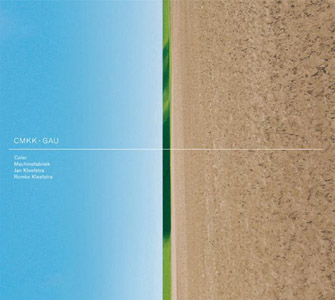CMKK, "Gau"
 Recorded near the end of a European tour, Gau is the collaboration of Will Long (Celer), Rutger Zuydervelt (Machinefabrik), and brothers Jan and Romke Kleefstra. Although on their own these artists tend to work in quiet, sparse sounds, on this single improvised piece all open up quite a bit, bringing with them some forceful, aggressive moments as well as their traditionally restrained ones.
Recorded near the end of a European tour, Gau is the collaboration of Will Long (Celer), Rutger Zuydervelt (Machinefabrik), and brothers Jan and Romke Kleefstra. Although on their own these artists tend to work in quiet, sparse sounds, on this single improvised piece all open up quite a bit, bringing with them some forceful, aggressive moments as well as their traditionally restrained ones.
With its deep, rumbling opening—a field recording of thunder I assume—I at first expected more of the placid, introspective sounds that I have heard from Celer and Machinefabrik before, but once a bit of tortured guitar tone rose up sharply, my expectation changed.Even early in the piece, electronic static and crackles appear to form a dissonant counterpoint to the more musical nature of the guitar and an added synthetic tones.
The combination of the two approaches—musical and abstract—appears repeatedly throughout the nearly 48 minute duration of Gau.Complex loops of samples, laptop noise and found recordings trade off with quiet reverberating tones, as melodic electronics bounce off dissonant guitar noise and squall.It becomes forceful at times, but never aggressive or raw.
Jan Kleefstra's spoken word performance throughout is normally something I would find off-putting or distracting on an album such as this.Given that the rest of the piece is subtle electronics and occasionally boisterous drama, I initially worried that the presence of a human voice would be distracting and shift the focus too greatly, but that ends up not being the case at all.The vocals are performed in Frisian, an uncommon Germanic tongue, and placed tastefully low in the mix.They are not obscured by any means, but feel perfectly appropriate when they do appear.
I admit some trepidation in going into this album, because while I have the utmost appreciation for the work of both Celer and Machinefabrik, both of them tend to work in those delicate, sparse realms of sound that I have become a bit burnt out on as a genre.In this collaborative setting, with the two Kleefstras, the result is a bit more jagged and abrasive and therefore hit me as being fresh and different than what I expected.Gau does an exemplary job bouncing between the pensive and the ragged moments, and it is that unpredictability that is its greatest asset.
samples:
 



